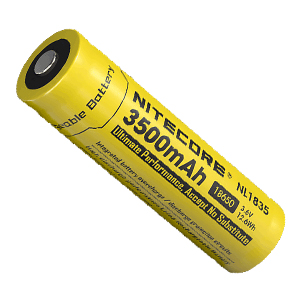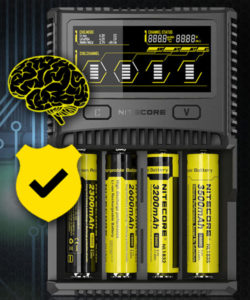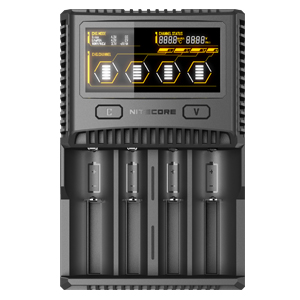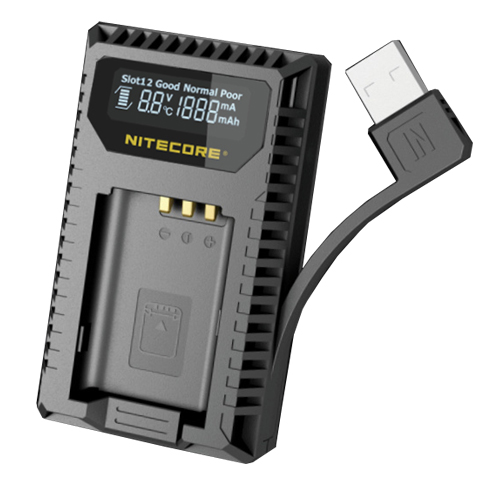Key Takeaways
- Make sure the type of rechargeable batteries you have are compatible with the charger
- See if the battery charger has features that prevent common problems like overheating, overcharging, etc.
- Consider the convenient features that a charger offers to help enhance your experience with the charger
- The source of power for your charger helps determine which charger is best for you
Tip #1: What types of batteries do you use?
Not all chargers support all battery types. Therefore, the first question you want to ask yourself is what rechargeable batteries you use today and you would like to expand into in the future. When picking out a charger, make sure you review the supported battery type and sizes to make sure the batteries you need to charge will be supported by the charger. Below are the most common types of rechargeable batteries on the market.

Li-ion batteries
Li-ion batteries, a.k.a lithium ion batteries or shorthand as lithium batteries, are most frequently used in flashlights, headlamps, vape devices and other electronics such as photo cameras and surveillance cameras. They are energy dense with high capacity of power packed in. Best of all it can be recharged up to 500 times without noticeable memory effect. Memory effect is a common problem that previous generation of rechargeable battery types often suffered. The most common li-ion battery types are 16340, 18650 and 21700 rechargeable batteries. See our battery buying guide for more information.
Ni-mh/Ni-cd batteries
While the name of Ni-mh or Ni-cd rechargeable battery types might be a bit new to you they are actually the rechargeable version of the most common household batteries such as AA, AAA, C and D. Use the rechargeable batteries so you can stop buying disposable batteries which saves you money and the environment. Best of all these rechargeable batteries don’t have battery acid leakage issues like the disposal batteries.
LiFePO4 batteries
Less common than li-ion batteries, LiFePO4 batteries are shorthand for Lithium iron phosphate batteries. LiFePO4 batteries are the safest lithium battery types, and specifically engineered to deliver a high cycle life and excellent performance over a wide operating temperature. If you are an early adopter of this new type of lithium batteries, check out our i, D, and SC series chargers. Furthermore, this type of battery often requires a specific charging current and/or voltage so consider a D or SC series charger which offers the most control over the charging experience.

Tip #2: What safety protections does the battery charger offer?
When it comes to battery chargers, safety is one of the most important concerns. You’re going to want a charger that has safety measures to prevent things like exploding, catching fire, or potentially damaging your batteries. Be sure to check charger manuals to make sure they have features like these to ensure your safety and your equipment’s safety.
Reverse polarity protection
Who doesn’t make mistakes from time to time. Reverse polarity protection automatically cuts off the charging current when you accidentally put the battery in the wrong direction. This prevents short circuits and potential fire hazards. This is the most important safety feature you need to look for.
Overcharging Protection
Overcharge of the battery may damage the battery and shorten the lifespan of rechargeable batteries. Ideally you want a charger who does not only display the charging status but also automatically detect the status of your battery and apply the optimal charging current. This prolongs the life of your battery and gives you the quickest charge possible for your configuration.
Overheat protection
Heat is an unavoidable side effect of any battery charging process. It is important to look for a charger with optimal heat dissipation design and made from fire resistant, flame retardant material.
Tip #3: What convenient features does the battery charger offer?
While these convenient features may not be critical to the charging function itself, they sure make your charging experience a lot more enjoyable. Below are the most important features that will not only make your life easy but also speed up your charging process.

Charging status display
While rarely a charger offers no charging status at all, the charging status display feature varies significantly. Some basic chargers only display red and green status for charging and complete charging. You won’t know how much battery power left and estimate how long it will take to complete the charge. Really inconvenient! The three bar indicator is so much better and sufficient for most usage scenarios. However, my personal favorite is definitely the digital charging status that tells you the amount of battery power left and how long it takes to complete the charger.
Multi-bay channels support
There are single, double, four, and even eight bay battery chargers on the market. Obviously, the more bays the charger has, the more batteries it can change simultaneously which speeds up the charging process. However, the more bays it supports, the bigger the charger becomes. So consider how many batteries you need to charge at the same time and where you carry the charger. If you carry the charger around, single bay chargers are lightweight and ultraportable. If you plan to use the charger at home, we recommend 2 or 4 bay chargers depending on how many batteries you typically need to charge at the same time.
When you use multiple bay battery chargers, you also need to look for a charger that controls the charging status and current of each bay independently. Otherwise, the charger may distribute most of the charging current to the first bay battery or doesn’t provide optimal charging current for each battery depending on their battery status.
Fast charging protocol support
Who doesn’t love the long battery runtime no matter what device you use! However, longer battery runtime requires bigger battery capacity, which in turn takes longer time to charge. Fast charging features aren’t absolutely needed but are surely handy when you are waiting for the battery to charge up. Some of the fast charging designation simply means higher charging current. However, QC (Quick Charge) 3.0 charging support is specific for USB chargers and USB devices.

Tip #4: How do you power the battery charger?
Where do you use the battery charger? We touched the subject when we discussed the multi-bay battery chargers. Beside the size of the charger, you also need to consider the power source the charger supports.
AC or Car power adapter
If you use the charger mainly in the office or at home, AC power adapter support is sufficient. If you use the charger on the road a lot, 12v car power adapter might be a convenient addition to the charger.
USB chargers
USB chargers is another very popular option and turned into the defacto standard for new battery charger models. If you are still worried that USB powered chargers charge too slow than the traditional AC powered charger due to the smaller charging current. It is no longer a concern. New USB 2.0 /3.0 and USB-C standards support higher charging current and more efficient charging protocol as more and more electronic devices like phones and notepads use USB power sources. Even laptops start to adopt USB-C power adapters.
USB Power Adapter
When you buy USB chargers, you also need to consider what USB power adapter you will pair with the charger. If your USB power adapter only supports up to 1A current output, then the charging speed won’t be there for you no matter how good the charger is. Ideally you want to pair your USB chargers with a 2A output power adapter. If your charger supports QC2.0 or QC3.0, you want to make sure that the power adapter also supports the QC 2.0/3.0 protocol.
Compare NITECORE Battery Chargers
NITECORE has an impressive line of battery chargers that can meet your needs. You can learn even more about the NITECORE battery charger lineup here or start to browse and compare all of NITECORE selections.

